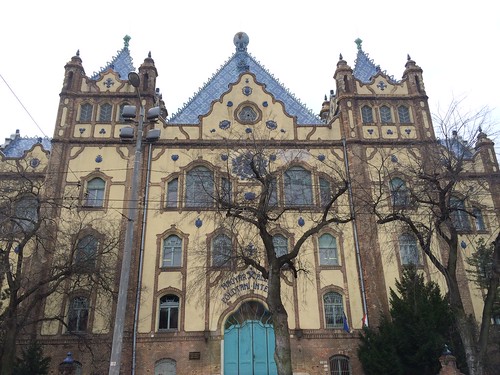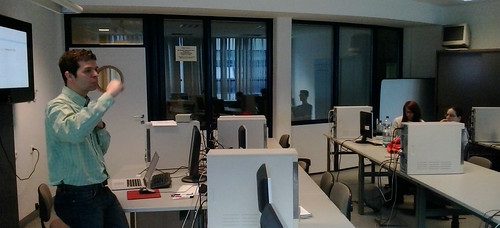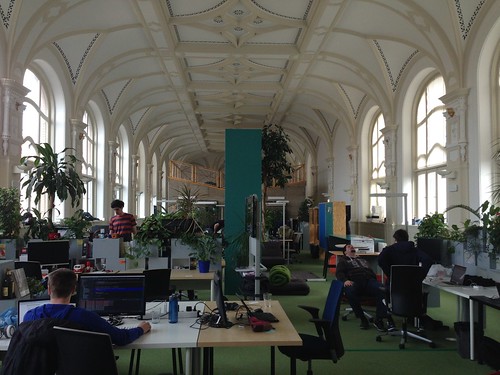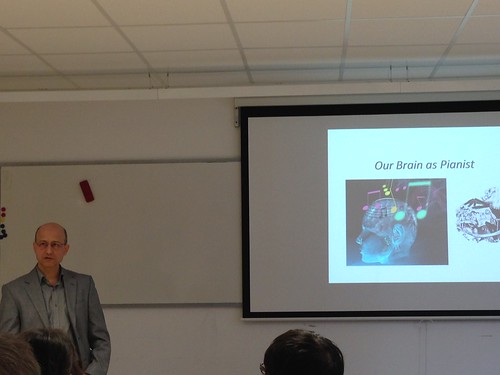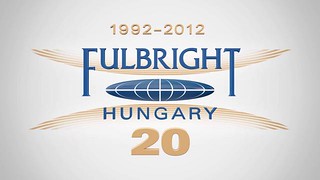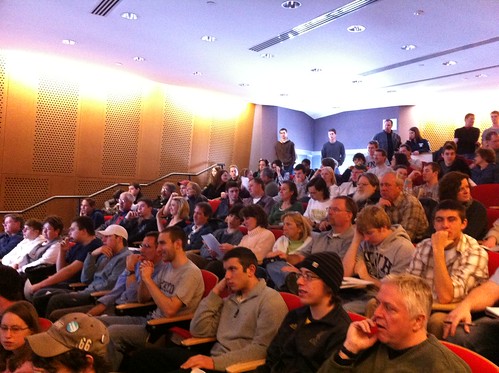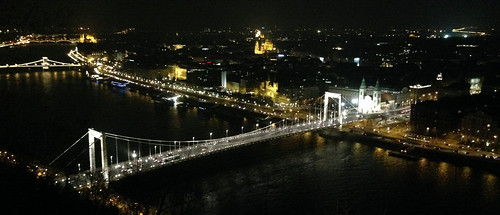
Last week I attended the orientation for the 2014 spring group of American Fulbright grantees in Hungary. I am grateful to the Fulbright Hungary staff for making the American grantees’ transition into life and work in Hungary smooth. I especially want to thank Annamária Sas, who is the Program Officer in charge of the American grantees. Annamária knows what needs to be done, and she accomplishes everything with seeming ease and with enthusiasm. I also want to thank Csanád Nagypál for his work on our financial arrangments. Finally, I want to thank Dr. Huba Bückner, Director Emeritus, as well as Dr. Károly Jókay, Diretor of Fulbright Hungary, for their leadership of Fulbright Hungary. Their strong engagement is evident in the work of the organization.
The orientation covered three areas:
- Life in Hungary: history, language, customs, art, and current affairs.
- Work in Hungary: organization of higher education, suggestions for success in teaching and research, and engaging the citizens of Hungary.
- Practical issues: working with Fulbright Hungary, and with the US Embassy in Budapest.
In retrospect, it’s amazing how much we learned about these areas in just four days. Below is a brief overview.
History. Hungarians feel a strong connection to their history. We were treated to a stellar history lesson (covering over 1,000 years of Hungarian history, starting in 896) by Prof. Dr. Tibor Frank. We also participated in a guided tour of the city, learning many tidbits from our guide. And in our visit to the Hungarian Academy of Sciences we saw, and sometimes even touched, items such as a 16th century Hungarian codex, and artifacts collected by the founder of tibetology, Sándor Csoma de Kőrös.

Gábor Tóth of the Hungarian Academy of Sciences showed us this codex.
Language and customs. Over the centuries Hungarians have worked successfully to maintain their language. The Fulbrighters who do not speak Hungarian were introduced to basic words and expressions by a passionate teacher, Mária Sánthané Gedeon. Mária also spent time exploring the differences in culture and customs between Hungary and the US. One of the differences: Americans are more likely to be assertive than Hungarians. Donald Morse, who has lived in Hungary for many years, also discussed customs, from what to bring to dinner parties (flowers, wine), to who pays for lunch (the person issuing the invitation). Professor Morse also recounted personal experiences of Hungary’s recent communist history.
Music. Hungary’s rich contribution to the world of music was discussed by Dr. Veronika Kusz, a musicologist at the Hungarian Academy of Sciences. Veronika provided a brief overview of the works of the most influential Hungarian composers over the centuries. I was delighted to discover the 16th century lutenist, Bálint Bakfark. Following Veronika’s presentation we attended a spectacular ballet performance of Onegin at the Hungarian State Opera.
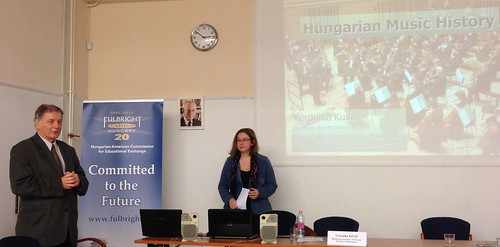
Dr. Huba Bückner, Director Emeritus, introduces Dr. Veronika Kusz
Current affairs. We explored current affairs with two people who are shaping the future of Hungary: Katalin Ertsey, Member of the National Assembly, and TV host Dr. Levente Boros Bánk. The discussion was animated, especially since Hungarian parliamentary elections are scheduled for April 2014.
Work. We spent a considerable amount of time discussing work life, and how to leverage our time in Hungary to our benefit, and to the benefit of our hosts. Dr. Huba Bückner, Director Emeritus, as well as Dr. Károly Jókay, Diretor of Fulbright Hungary, urged us to be ourselves, so that our Hungarian students and colleagues can gain experience dealing with the US model of education and research. Prof. Dr. Zoltán Abády-Nagy gave us an overview of the Hungarian higher education system, from organization, to historical perspectives, to faculty career paths. And current student grantee Jamie Hoversen warned us plan ahead, because there is so much to do and never enough time to do it all.
Engaging citizens of Hungary. Karyn Posner-Mullen and Dmitri Tarakhovsky, both with the US Embassy in Budapest, discussed ways in which we can engage the citizens of Hungary, from participating in the work of American Corners, to attending events organized by the embassy, to making our own professional and personal connections. Erika Sólyom, the director of the Budapest American Corner, discussed specific types of programs we should consider participating in.
Practical issues. Finally, we discussed a number of practical issues, from the ever important financial issues, to the reports required by Fulbright Hungary, to taking advantage of US Embassy resources. I was also glad to hear that there’s a Hungarian Fulbright Alumni Association, which is headed by Dr. Katalin Nagy.
Last, but not least, I’m very happy to have met the new American Fulbright grantees in Hungary: Stephen Hartke, Janet Holmes, Amy Forss, Andrea Mitnick, Leslie Muray, Nicholas Rubashkin, and Peter Szende. I’m looking forward to following their efforts.
You can see more pictures from the orientation on Flickr.

With my wife Jennifer at the Hungarian State Opera presentation of Onegin.
